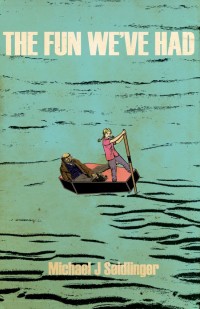 |
The Fun We’ve Had
by Michael J. Seidlinger
Lazy Fascist Press, 2014
168 pages / $11.95 buy from Amazon
Rating: 7.9
|
How do you write a thrilling and entrancing Alt Lit novel?
Start with a chorus of disembodied voices telling us that “the waves are helloes; the incoming storm the sincerest goodbye. Like every single one of us, they are holding on. We held on until we could no longer hide. No one can hide out at sea.”
Then, add two characters trapped in a coffin adrift at sea. Make the characters as disparate as possible—have one be an old man and one a young girl. Set them at odds with one another—the more tense the better.
Then write in a very cryptic style. Use a lot of ambiguity, but be sure to not answer ANY questions that you’ve raised about your characters. Who are they? How did they get in the coffin? Why do they seem to be trapped in each other’s bodies? (Well, maybe answer one or two of them, but only at the very end of the book, otherwise it will spoil the fun.)
Keep up the tense pace with framing devices. The five stages of grief should work nicely. Also an alternating “his turn”/”her turn” chapter division will work nicely.
Add some sex, some existentialist dread and some metafictional flair.
Write a line like “Everyone is capable of a lifetime and nothing more,” and a line like “Everything changes. Nothing is true.”
Toss in some motherfucking sharks and a hurricane of jellyfish falling from the sky, which will result in the mincing of your character’s physical bodies (but not their spiritual presence).
Add some of that aforementioned closure, but not too much! Wrap things up nicely. Talk about how we’re all in this sea called life together. There are no lone sharks.
After you’ve do all that, you should have a book that looks like Michael J. Seidlinger’s The Fun We’ve Had—one of the most gripping books to come out in a while. Now sit back and bask in your creation and wait for the praise to roll in through Facebook and Twitter.
Tags: Lazy Fascist Press, Michael J. Seidlinger, The Fun We've Had

Can’t tell what the reviewer’s purpose is here. Summarize main plot points? Make the book writing process seem easy or obvious? Be kind of snarky/sarcastic? Idk maybe I’m picking up on tone that isn’t actually there, but this review annoyed me. I mean, they say it is “one of the most gripping novels to come out in awhile” but that statement felt upended by the final sentence.
I felt the same way. I don’t really understand this and it annoyed me vaguely.
The reviewer identifies Seidlinger’s novel as exemplary of things s/he sees as typical of the form and what’s wrong with it. Too-abstract language expresses a too-abstract conceit; a contrived situation is presented with no setup or explanation, populated by characters manufactured to present a dramatic philosophical contrast that is made unsatisfying by the aforementioned contrivance without setup or explanation; certain ideas, “framing devices,” and concepts used seem picked apparently at random and simply for the sake of lending something, I don’t know, cool, I guess, to the narrative (“five stages of grief,” “sex,” “existentialist dread,” metafiction, etc.); facile truths presented in language just opaque enough that they seem profound; random things come to populate and events to occur in the novel’s universe that are made unsatisfying by the aforementioned contrivance without setup or explanation and thus seem yet more of that very contrivance, combined with some more of that stuff that seems used apparently simply for the sake of lending something, I don’t know, provocative, I guess, to the narrative (“motherfucking sharks,” “a hurricane of jellyfish”); and a parting shot to the book that reflects what the reviewer sees as the formula it makes use of, which is easy for anyone to replicate, the reviewer implies, by virtue of having been distilled in this review. As I write all these out, none seem like trends or concepts you could object to or even identify as “things” that are “typical of the form and what’s wrong with it” the way the reviewer seems to have intended them, except in the very subjective sense of personal preference, the sense of polemic rather than argument, not helped by use of “Anonymous” rather than a reviewer’s name as might typically be expected—though lent a weird power by that all the same, an authority of sorts, perhaps undeserved?, at least to me—which I suppose is why the review seems so hard to categorize and so vaguely annoying to read?
[…] Fanzine review HTMLGIANT review […]
[…] Fanzine review HTMLGIANT review […]